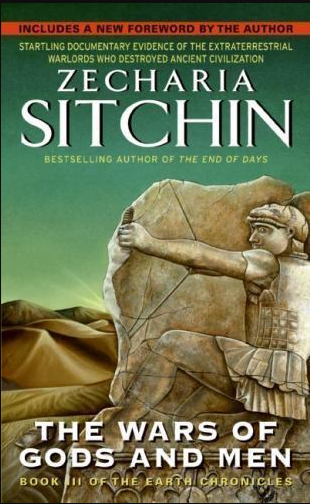Posted: February 10, 2023
The Wars of Gods and Men

An atomic explosion in the ancient world marks the end of the Sumerian Empire and a transfer of power among the Annunaki
For me, the biggest thing in "The Wars of Gods and Men" is the description of the end of the Sumerian Empire - the first empire of man. Sitchin makes the case for its destruction by the use of nuclear weapons. He also brings up a fascinating point that, when this information first came to light in the nineteenth century, the ones studying it at the time could not make full sense of it. They couldn't because nuclear weapons were unknown at the time. Not so now when we are familiar with nuclear weaponry and can "map our knowledge" of it to the events of four thousand years ago in Sumer. It is chilling how our current knowledge of Hiroshima and Nagasaki is mirrored in the events of that time, familiar to most of us from the tale of Sodom and Gomorrah in the Bible. It turns out that these two cities where just a part of the targetted area - all of southern Mesopotamia was the target. So massive was the destruction that the blast created the southern portion of the Dead Sea.
As usual Sitchin rambles a bit at the beginning. In the last book "The Stairway to Heaven" he spent some time talking about the quest for the fountain of life by both the Spaniards and Alexander the Great. This time he dives into the Iliad by way of illustrating a war with both gods and men. Soon enough he goes to the subjet proper - the history of the Annunaki.
He does go over ground covered in the previous two books. In my opinion, it is not so much being repetitive as being exhaustive about the topic. Yes, know a lot of this stuff already but some details are new. For example, for the first time Sitchin talks about a third major center of civilization after Sumer and Egypt. This was the Indus Valley civilization. When learning of this I assumed that this civilization has direct lineage to the India of our time. But Sitchin states that it is not so. The Indus Valley civilization only lasted a thousand years - shortest of these three early human civilizations. I'm also coming out of this book with some helpful dates regarding the start of the various civilizations: Sumer began 3800 B.C.E, Egypt 3100 B.C.E, and the Indus Valley civilization 2800 B.C.E. The desolation of Sumer around 3000 B.C.E.
At the heart of this book is the rivalry between the gods led by Enlil and those led by Enki. Things really came to a head in Egypt where Sitchin details both the First and Second Pyramid Wars. It was during this time that Ninurta, son of Enlil, pretty much destroyed the function of the main Giza pyramid as a flight beacon. The pyramid was also used, because of the machinations of Ishtar, as a temporary prison for Marduk, son of Enki.
During the Pyramid Wars and the other wars that followed the gods armed men and created armies to fight their battles. Territorial battles for the most part. This culminates with the nuclear holocaust that ended Sumer.
But this holocaust did not end the gods so the story continues and I'm eager to see if the other books contains the rest of the tale. I'm particularly curious to find out why the Annunaki are no longer among us.
I found the book to be an engrossing read, slightly better than "The Stairway to Heaven". The one criticism I have is that, at one point, Sitchin really nerds out on the description of the largest of the Giza pyramids, my eyes started to glaze over with the information overload. But aside from that, this is an interesting book particularly the last chapters describing the twilight of the Sumerian Empire.